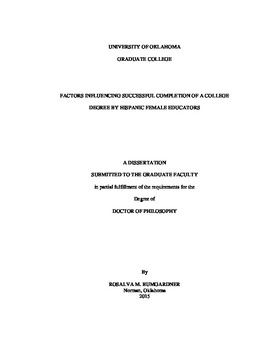| dc.description.abstract | Despite educational attainment gains over the years, Hispanics lag behind their White and Black peers in achieving a college degree. For 2013, the National Center for Education Statistics (NCES) reported only 16 percent of the Hispanic population achieved a bachelor's degree as opposed to 40 percent for Whites and 20 percent for Blacks (NCES, 2014, Educational Attainment). Additionally, a persistent gap in educational achievement persists. The White-Black educational gap widened from 13 to 20 percentage points, and the Hispanic-White gap widened from 18 to 25 percentage points between 1990 and 2013 for 25 to 29 year olds (NCES, 2014, Educational Attainment). Using qualitative multiple case analysis, the purpose of this study is to identify factors influencing degree achievement of Hispanic female educational professionals from the Rio Grande Valley in south Texas and to determine if identified influential factors are grounded in self-efficacy theory. From the data collected via personal interviews and a focus group meeting, cross case analysis illuminated overarching themes common among the cases. Findings revealed the emergent themes grounded in self-efficacy theory. | en_US |
